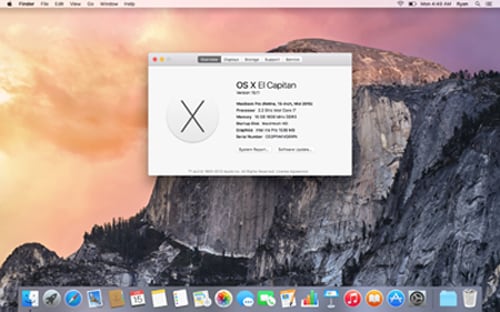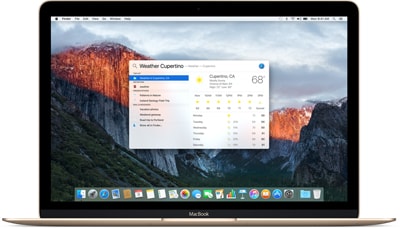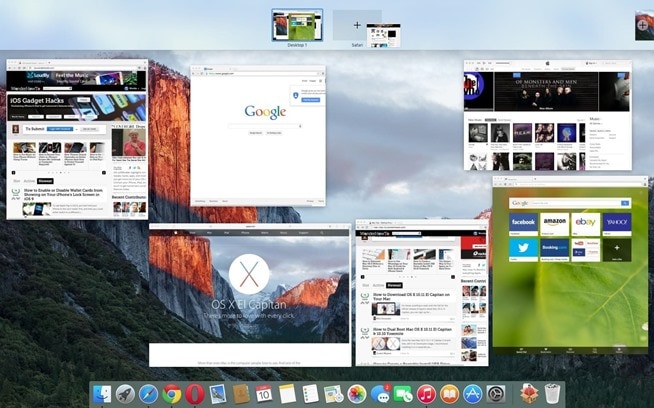You need to know whether your Mac system will run the new Mac OS X El Capitan and one of the things you need to check is whether the latest version of Mac OS is supported by your Mac hardware. The new Mac OS X El Capitan will be released by the end of June of 2015, and the hardware system requirement can be enormous. Your hardware should be able to run the latest Mac OS X El Capitan if it has OS X Yosemite or OS X Mavericks: these two are the basic hardware requirements you should consider. However, if your system doesn’t meet these basic requirements, you don’t have to get out of your way and purchase a new hardware, for most of the Mac OS released in the past 5 years will be supported.
- Part 1. Supported Mac Models and Hardware for Mac OS X El Capitan
- Part 2. What Are the System Requirements for Updating?
- Part 3. The Optimal Requirements for Mac OS X El Capitan
- Part 4. Why We Should Update to Mac OS X El Capitan?
Part 1. Supported Mac Models and Hardware for Mac OS X El Capitan
As far as Hardware requirements are concerned, the new Mac OS X El Capitan will support the following hardware:
- ● iMac ( from 2007 upwards);
- ● The 13 inch Aluminum 2008 edition MacBook, or 2009 edition and older;
- ● The 13 inch 2009 MacBook Pro;
- ● The 15-inch or 17-inch , 2007 MacBook Pro or newer versions;
- ● The 2008 MacBook Air or newer version;
- ● The 2009 Mac Mini or newer version;
- ● The 2009 early edition Xserve.
Some of the Mac systems that do not meet up with the minimum hardware requirements for Mac OS X El Capitan include: iMac 4.1 to 6.1, MacBook 1.1 to 4.1, MacBook Pro 1.1 to 2.1, MacBook Air 1.1, Mac Mini 1.1 to 2.1, Mac Pro 1.1 to 2.1, and Xserve 1.1 to 2.1.
Part 2. What Are the System Requirements for Updating?
One of the most important system requirements for the installation of Mac OS X El Capitan is that your Mac system must possess 64-Bit CPU, and this is a typical component of Intel Core 2 Duo or a newer version of processor. Beyond the CPU processor requirement, most other requirements are quite easier to meet up with. You need to have at least 10GB of dick space in order to install the final version of Mac OS X El Capitan. If you are unsure about your hardware system, you can have a quick check by simply going to the Apple menu, then click on "About This Mac", and choose "Overview", and then look out for the name of your Mac device and the year manufactured.
The optimal requirements for a better performance are quite different. However, system speed requirements are general for all Mac devices, and the newer the Mac device, the faster the software and apps will run. The more the RAM memory for instance, the faster your Mac OS X El Capitan software runs on your system, in addition, a faster SSD Disk drive will boost the performance of the software on your Mac.
Part 3. The Optimal Requirements for Mac OS X El Capitan
- ● RAM - The minimum RAM requirement for optimal performance and installation of Mac OS X El Capitan is 2GB. Though this could still be slow, a 4GB RAM size is preferred, and even larger RAM will make the Mac OS X El Capitan perform at faster rates.
- ● The Drive Space - Your Mac device will require a minimum of 8GB of drive space to function at its optimal. The minimum 8GB does not provide the ideal amount of free space to effectively run Mac OS X El Capitan for a long time, but the space will help you complete its installation. If you are trying out Mac OS X El Capitan on a virtual machine, or on a partition, you may need as much as 16GB minimum for the installation and running of the software- this space will accommodate the applications installed. However, you will need up to 80GB of space if you are installing the software on a real world PC environment.
Part 4. Why We Should Update to Mac OS X El Capitan?
Mac OS X El Capitan is not just an upgrade, it comes with some new and exciting features that make it more powerful, usable and more flexible than previous Mac OS. The main reasons why you should update to Mac OS X El Capitan include:
Performance Improvement - The new Mac OS X El Capitan opens PDF documents 4 times faster than the fastest Mac OS, displays your emails 2 times faster, provides 2 times faster app switching time and up to 1.5 times faster Apps launching. Generally the performance of Mac OS X El Capitan is far greater than the Mac Yosemite. Generally your system becomes twice faster and more responsive with Mac OS X El Capitan.
Spotlight Enhancements - Another reason why you should update to Mac OS is that the new Spotlight feature allows you to resize and move the window around the desktop screen. Likewise you can now write queries and codes in natural language, and you can track down your mails and documents easily through the search. The new Spotlight provides new transit directions for your videos, Maps, stocks and much other vital information.
New Split View & Mission Control - With the new Mac OS X El Capitan, you can now split your screen in equal halves and run two apps at the same time. The new Split View mode means you don’t have to split the screen manually and this new system helps you save time while browsing through contents and writing on the other screen. Mission control provides an easy switch between all opened apps thus they do not overlap on your desktop.
In-built App Enhancements - With the new Mac OS X El Capitan, you can edit your pictures and add some details. The new Safari can also help you mute background noises from apps, while the Maps in the Mac OS X El Capitan helps you plan your trips even much easier by providing you with details of public transportation, subway routes and many more.










